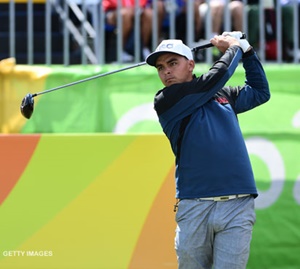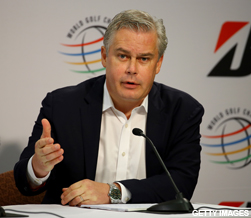 |
| Rickie Fowler was one of the more familiar names in the Rio Olympic golf competition. |
The first Olympic golf tournament in 112 years ended up a competitive success despite a diminished field, with three established winners taking medals in a hotly competitive final round.
But after the women’s tournament this week comes the hard part: Leveraging the Olympics to build some kind of market for the sport in Brazil, where it’s virtually nonexistent. Here’s where the sport starts: An estimated 20,000 Brazilians — or one out every 10,000 — play golf, and Rio de Janeiro has just two private courses populated only by the very top of the economic ladder.
The Olympic Golf Course will become Rio’s first public course after the Games, when it will be turned over to the Brazilian Golf Confederation to operate. British journalist David Owen suggested its most significant legacy may be as a wildlife refuge amid rapid development, not a sport business.
“You can’t have outsized expectations, but you have to understand slow and steady growth is just as important as if you have some quick explosion of growth and then it goes away for whatever reason,” said Ty Votaw, PGA Tour chief marketing officer and vice president of the International Golf Federation, during an interview in the Bridgestone hospitality tent off the 18th fairway.
Galleries were modest by major PGA Tour event standards, but they gradually grew over the course of the four-day tournament and the grandstands were packed to see Brit Justin Rose emerge as the gold medalist by breaking a tie with Swede Henrik Stenson on the final hole.
For the tournament, 43,500 tickets out of a possible 60,000 were sold across the four days, though traditional golf enthusiast countries appeared to dominate the galleries. The event sold out 15,000 tickets on Sunday.
New worldwide Olympics sponsor Bridgestone saw some encouraging signs from local Brazilian fans, said Phil Pacsi, Bridgestone Americas VP, sports and events. Through midday Saturday, 1,000 people had gone through Bridgestone’s sponsorship showcase at the golf course, and “75 percent were Brazilians who never touched a club before.”
The on-venue Bridgestone showcase and hospitality tent are unusual by Olympics standards, which normally insist on “clean” venues. Pacsi credited the IOC for allowing the corporate activity to advance their common interest in building the sport. The equipment in the showcase will be turned over to the Brazilian Golf Confederation to develop a teaching academy at the course.
During a tour of the course, Brazilians were seemingly in good spirits at the activation, but with a familiar look among golfers: frustrated by the mini-golf and confused by the instructor’s directions in the driving cave.
 |
| Ty Votaw, VP of the Int'l Golf Federation and CMO of the PGA Tour |
More from the chat with Votaw:
■ What are your expectations for golf in Brazil?
VOTAW: I think we’re realistic; obviously there isn’t a big golf marketplace here. But having experienced the people in Brazil who are devout golfers, and the Brazilian Golf Confederation that’s going to manage this property when the Games are over, and their dedication to a golf-for-all kind of program, where young people can be introduced to the game, and a teaching academy can be part of the overall facility, you have to just take it stone by stone and brick by brick, and build it.
■ Do you have any numbers in mind?
VOTAW: Not right now. We want to see how we experience this couple of weeks in men’s and women’s golf, make sure that we the IGF help the BGC to everything to make sure this property is a vibrant one, and its public access is one that can work, and we’ll see where it goes.
■ What do you say to the golfers who qualified but chose not to attend?
VOTAW: I’ve said all along that even before coming into these weeks, but certainly these two weeks, we’re going to focus on the Olympians who are here and not necessarily the golfers who may or may not be Olympians in 2020. All we care about is the experience that these guys have this week, and what the women golfers have next week. And from all indications they’ve had wonderful experiences. You can see on social media, you can see it with their comments to the media, and you can see it with their comments on this golf course. From that perspective, golf has already won in terms of what the reaction and experience has been from our athletes.





